How will you live an evergreen life? On 19th March this question reverberated around London Business School at our recent event, ‘The Longevity Imperative by Andrew J. Scott’. The event marked the launch of Professor Scott (Professor of Economics at London Business School)’s new book: The Longevity Imperative: Building a Better Society for Healthier, Longer Lives.
The event highlighted the impact of increased lifespans and the societal pivot necessary to embrace this change. Professor Scott began by emphasising the comparative significance of longevity compared to other global phenomena like AI and climate change. Countering the Malthusian view with the success of the Industrial Revolution, he showcased our potential to combat the looming pension crisis with proactive measures aimed at enriching the later stages of life.
The Societal Shift
A 20-year-old’s chance of living to 90 has leapt from 3% to almost 40% since 1930. This is a monumental shift in how we conceive of a lifespan, which Professor Scott calls the ‘second longevity revolution’. There needs to be a comparative shift in understanding to ensure that we not only live longer but more fulfilled lives.
A vital takeaway from the discussion was the paradox of ageing solutions: the more effectively we address ageing now, the further we push the average age forward. The imperative is not only to age but to age well—to ensure that our strategies for extending life are matched by efforts to enhance life’s quality, vitality, and meaningful engagement at every stage.
The focus should not only be on extending life but ensuring these added years are lived well; preventive rather than reactionary healthcare is essential. Today’s greatest health-related burden lies in age-associated diseases, suggesting that our golden years should focus more on self-care and less on hospital care — a sentiment echoed by healthcare systems worldwide.
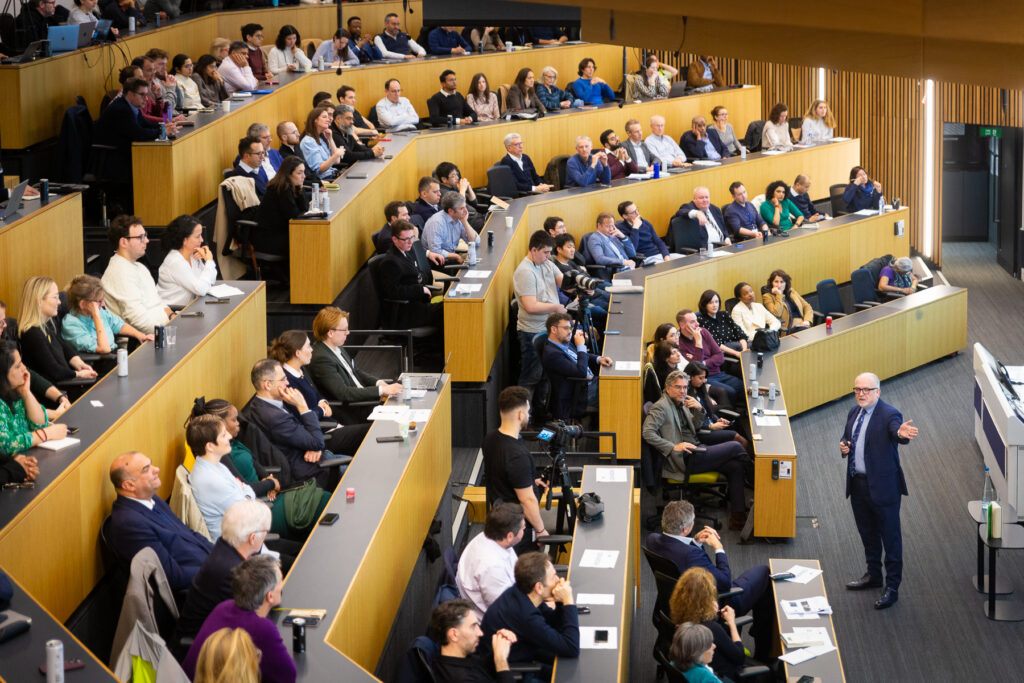
The Economic Shift
Economic considerations came to the fore as Professor Scott discussed the shortcomings of merely extending the retirement age. With many exiting the workforce earlier than 65, there is a compelling argument for creating workplaces and educational opportunities that value the contributions of older adults. The conversation naturally extended to government policy, where strategies to support ageing populations took centre stage. Discussions encompassed initiatives from incentivising birth rates to reimagining adult education, aiming to transform longer lives into societal assets.
Professor Scott’s talk highlighted an urgent need for society and businesses to embrace and cater to an ageing populace. He advocated recognising the untapped potential of the elderly and called for innovation across health, wellness, and education sectors to meet their needs. He championed a societal shift towards active ageing, where businesses play a key role in shaping policies and creating an environment that views longevity as an opportunity for collective advancement and prosperity.
Fireside chat with Patricia Cohen
Following the presentation, the event transitioned into a fireside chat followed by Q&A that was moderated by Patricia Cohen. This segment of the event brought together earlier threads of discussion, providing a platform for deeper exploration of the socioeconomic implications of ageing societies. Patricia Cohen steered the conversation towards uncovering the nuanced relationships between longevity, economic policy, and societal well-being.
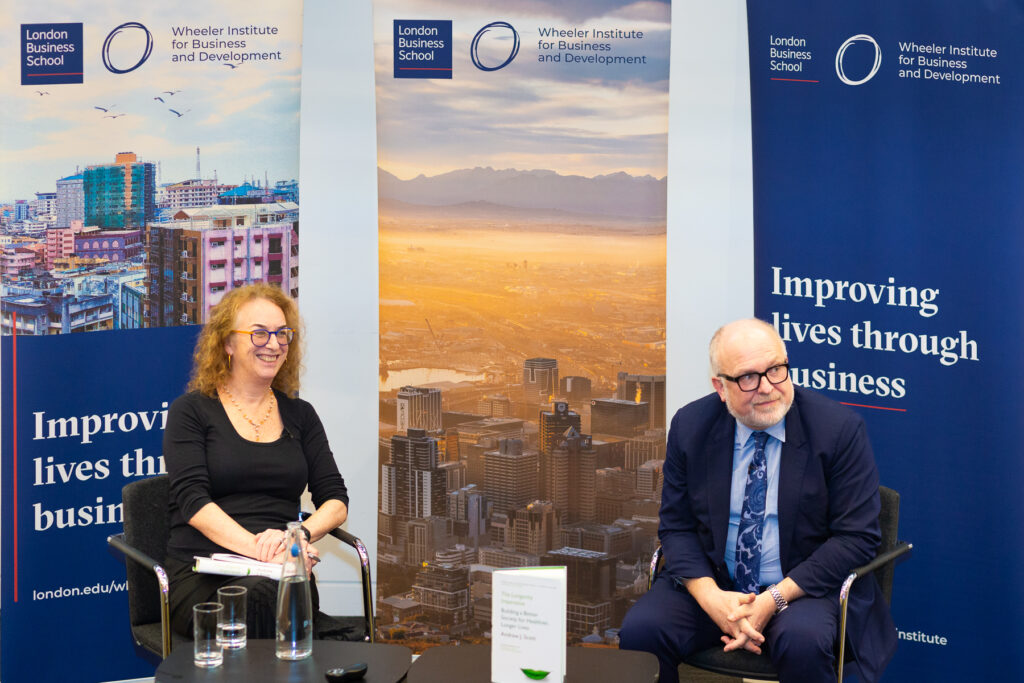
Is Ageing a Disease?
In exploring the so-called “miracle cure” of diet and exercise for ageing, Patricia highlighted the gap between knowledge and action in adopting healthier lifestyles. The conversation revealed how personal choices, societal norms, and systemic obstacles intertwine to hinder widespread healthful practices, echoing the insight that youth often cannot envision their older selves. There was consensus on enhancing public health initiatives, particularly focusing on preventative measures like addressing cardiovascular diseases rather than investing heavily in experimental treatments with limited reach. This underscores a collective responsibility to foster a culture that prioritises longevity and quality of life for all ages.
The debate on ageing as a natural process versus a disease challenges our perceptions and suggests that what we accept as ‘natural’ might be alterable. Drawing parallels with diseases like smallpox, once deemed inevitable, the conversation highlighted modern medicine’s capability to manage and even prevent age-related conditions like dementia. This shift in perspective implies ageing could be more a manageable aspect of health rather than an unavoidable decline, opening the door to interventions that not only extend life but improve its quality.
In Brief, Professor Scott helped us reevaluate ageing, to see it not as an inescapable natural decline but potentially manageable, inspired by advances in medicine that challenge old paradigms and offer hope for a healthier ageing process.
Rethinking Retirement
Patricia then steered the conversation towards the concept of retirement, questioning its relevance in a world where people live longer, healthier lives. Andrew J. Scott emphasised the need to rethink retirement policies to reflect the changing realities of ageing. The two discussed alternative models that encourage continued engagement in the workforce, albeit in less physically demanding roles, and the importance of lifelong learning and skill development to facilitate this shift. The dialogue evolved to address the intricacies of preparing for retirement, stressing that readiness for our later years transcends beyond financial security, finding the perfect retirement spot, or cultivating hobbies. It’s a broader, more holistic endeavour that encompasses fostering lasting health and engaging in meaningful activities that sustain not only the mind and body but also the spirit, well into our twilight years.
The discussion also touched on the role of government policies in shaping the outcomes of ageing societies. Patricia Cohen asked Professor Scott to consider the types of policies that could support healthier ageing populations, including boosting birth rates, enhancing preventive healthcare, and improving employment rates and care arrangements for older adults. The conversation underscored the importance of addressing the core issues that deter people from having more children and the need for comprehensive adult education programs to maximise the benefits of longer lifespans.

Economic Implications of Healthy Living
Lastly, the discussion moved into the economic implications of a shift towards healthier living. A member of the audience raised the point about the several potential economic consequences for industries built around unhealthy consumption habits, such as soda and fast food. Professor Scott argued that economic systems are adaptable and that shifts in consumer behaviour towards healthier choices could spur innovation and growth in new sectors focused on wellness and longevity.
Concluding Reflections
To conclude, Patricia emphasised the intersection of ageing, health, and economics, highlighting the collective responsibility to value a life that’s not just longer, but richer. The discussion outlined the complex challenges of ageing and the broad strategies needed to address them, advocating for The Longevity Imperative—a vision for a society that embraces a fulfilling life at every age, striving together for longevity as a shared success.
François Ortalo-Magné (Dean of London Business School) closed the event with a thoughtful reflection on what it means to be evergreen. ‘What are you going to do,’ he asked ‘to live a more evergreen life?’ How will you change the way you age?
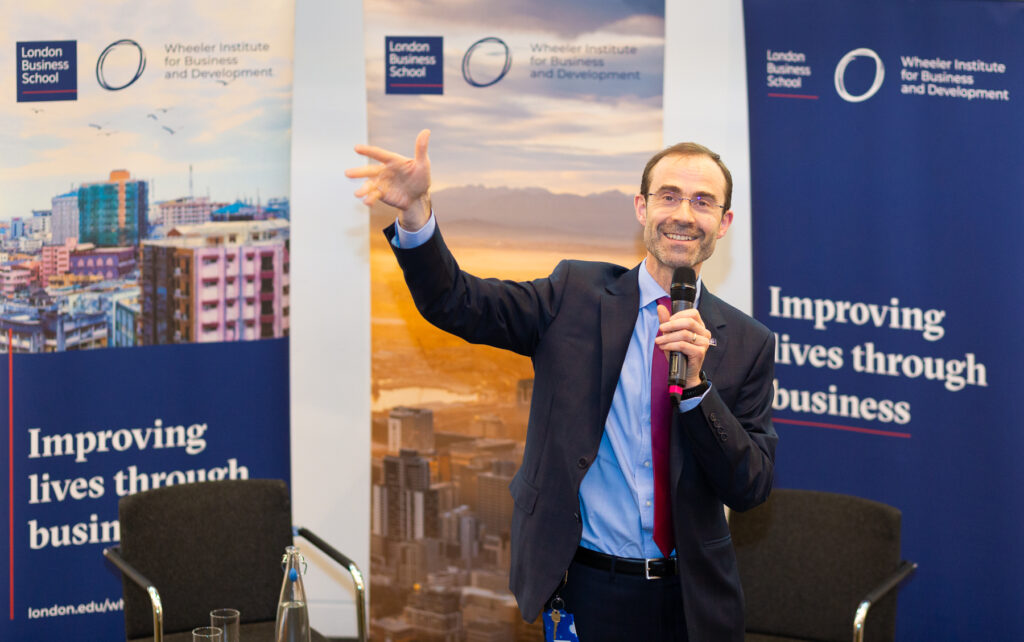
The Wheeler Institute was delighted to welcome Dr. Greg Siourounis (LBS PhD2000) to the event, which was made possible through the generous support of the Sui Foundation.
Advance Praise for The Longevity Imperative
‘Scott argues that if we change the way we live, longer lives can greatly improve the quality of life at all ages. The lessons Scott teaches readers will not only educate them but introduce them to a consummate storyteller and remarkable man’
Laura Carstensen, Fairleigh S. Dickinson Jr. Professor in Public Policy and Professor of Psychology at Stanford University
‘Finally, a manifesto to guide the Longevity Revolution. A revelation on every page. Should be required reading for every physician and politician.’
David Sinclair, Professor of Genetics at Harvard Medical School, author of NYT Bestseller ‘Lifespan’
‘Inspiring, enlightening and uplifting, The Longevity Imperative demands a radical rethink of aging by putting forward a blueprint for how to live well today, tomorrow and in the future. A wake-up call for business leaders and politicians, and a must read for anyone who wants a life well lived’.
Noreena Hertz, author of ‘The Lonely Century’
An ageing society has long been seen as a grave future economic threat, but what if longer lives could be turned into a source of economic growth? In this striking book, Scott outlines why changing how we age is so important, what needs to be done to succeed and just how large the potential gains are to both individuals and nations’.
Nouriel Roubini, author of ‘Megathreats’
About the speakers
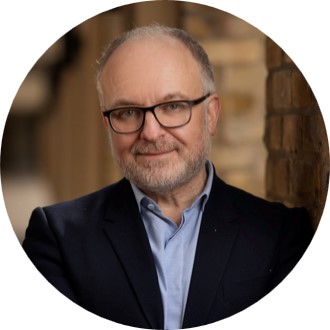
Andrew J. Scott is Professor of Economics at London Business School, a Research Fellow at the Centre for Economic Policy Research and a consulting scholar at Stanford University’s Centre of Longevity. His research focuses on longevity and an ageing society and has been widely publish in leading journals in economics and health. His book, The 100-Year Life, has been published in 15 languages, is an Amazon bestseller and was runner up in both the FT/McKinsey and Japanese Business Book of the Year Awards. Andrew previously held positions at Oxford University, London School of Economics and Harvard University. His MA is from Oxford, his M.Sc. from the London School of Economics and his DPhil from Oxford University.

Patricia Cohen is the Global Economics Correspondent for The New York Times, based in London. Cohen has a strong reputation for her writing, which covers economics, politics, the federal courts, books, art, and more. Her book, In Our Prime: The Fascinating History and Promising Future of Middle Age (2013) has been prasied as a ‘lively, well researched chronicle’ of middle age (The New York Times Book Review).
About the author
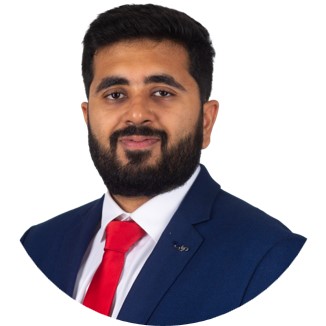
Mahesh Jamb, MBA2025 has a dynamic background in Indian tech startups, particularly in the e-beauty sector. With four years of experience, his most recent role involved leading the Data Product Team at a renowned e-beauty unicorn, focusing on pricing automation and other data-driven initiatives. His passion lies in fostering innovative growth and sustainability within SMEs in developing countries, especially in the consumer sector. Mahesh’s journey is marked by a commitment to leveraging technology for strategic advancements and impactful business solutions.
Discover our research portal and subscribe to our mailing list now

Vimal Chadha
Faustin